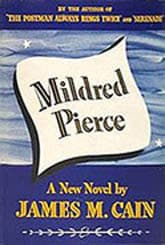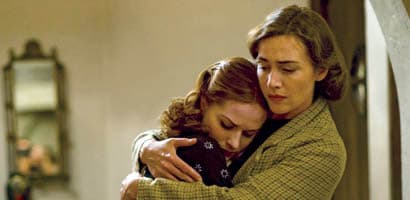Mildred Pierce
Critique • Quotes • At the movies
 First edition
First editionFirst publication
1941
Literary form
Novel
Genres
Literary, psychological thriller
Writing language
English
Author's country
United States
Length
Approx. 98,000 words

Evan Rachel Wood and Kate Winslet are the grownup daughter and mother in the miniseries.
Mildred in detail
Mildred Pierce (2011): Television miniseries, five episodes, 58–79 minutes each; director Todd Haynes; writer Todd Haynes, Jon Raymond; featuring Kate Winslet, Morgan Turner, Brían F. O'Byrne, Guy Pearce, Melissa Leo, Evan Rachel Wood, Mare Winningham
It's much more fun picking out the differences between the 2011 Mildred Pierce adaptation and the novel.
It's more fun picking out differences because the recent miniseries is so extraordinarily faithful to the book.The 1945 Joan Crawford movie made an entirely different kind of entertainment out of James M. Cain's psychological study. The series produced by HBO and starring Kate Winslet has made few and subtle changes.
Its attention to detail—detail of not only plot and character but of the California setting, styles and manners at the time—is quite amazing.
Remember, Mildred Pierce is supposed to take place throughout the hardscrabble decade of the 1930s. The 1945 movie basically played it as situated in its own time, with all the attendant glamour of 1940s style. (Picture Crawford and you'll likely envision her with those iconic wide-shoulder suits, fur coats and high-flying hats she wore in Mildred Pierce.)
The new series brings Mildred Pierce down to ground. We see her grow from the woman who bakes pies in her shabby kitchen to a diner waitress to a naive eatery owner to the confident head of a small restaurant chain. And we watch her quicker slide. Spread over about nine years. She visibly ages, from the sleek young "grass widow", as her friend Lucy Gessler types her, to a slightly more matronly woman approaching middle age.
Scary cold
Meanwhile, her daughter Veda also grows up, as in the book, from an adolescent to a young woman—although the switch in actresses is not quite credible. Both Morgan Turner (who plays Veda for three of the five episodes) and Evan Rachel Wood (two episodes) are good at evoking the supercilious brat who twists everyone around her finger. But they don't look anything like each other. Isn't there some kind of studio magic that can morph them into each other gradually, rather than just having the mature young woman suddenly appearing in the youngster's place?
Wood, particularly, has Veda down cold—scary cold—despite having quite a different body type and look from Cain's Veda (which makes one of the running gags about "the Dairy" fall flat in the film).
All the novel's characters get their screen time. A particular standout is Lucy, with Melissa Leo playing the earthy next-door neighbour who helps Mildred get started but ends up somewhere else. Ex-brat packer Mare Winningham plays the older waitress-turned-businesswoman Ida almost exactly as readers would imagine her.
Similar plaudits may go to the menfolk. Guy Pearce as Monty seems to be imitating Zachary Scott's appearance from the old film, right down to the thin mustache. But he's given space here to broaden the character to show his own changes—and changes of his relationship with Mildred—over the years. He's not just an gigolo, but an appealingly foppish and playful gigolo. And he brings his own aristocratic family history, his surprising common touch, and his passing good intentions. If only his own hedonistic interests didn't keep getting in the way.
Most impressive though may be the quiet performance of Brían F. O'Byrne, seen most recently on the American Prime Suspect television series, as the hapless Bert. O'Byrne is completely and equally believable as the cheating louse, a wonderful father, and eventually the only person who stands by Mildred through thick and thin.
Plus, in this version of Mildred Pierce he gets to engage in Cain's breathless dialogue at the end: "Let's get stinko."
We see him, Mildred and all the rest in colour, as we had visualized them while reading the novel. If the 1945 adaptation was film noir, this one is film brun. Director Todd Haynes's palette for Mildred Pierce tends to the earth tones of brown, green and muted yellow.
But the inclusion of all the period detail and extended characterization has a down side. The series has been criticized for being too long and slow. Truth be told, it does drag a little, especially when it's obvious what's about to transpire and you're just waiting for Mildred to twig to it. Those are times you're tempted to fast forward if you can.
But for Mildred Pierce aficionados, that's offset by the realization that even this Masterpiece Theatre-style reproduction of a literary work requires some cuts. The five and a half hours of this miniseries can still only squeeze in fifty percent of Cain's lines. Several entire scenes have been cut from the novel, though nothing of import.
Trailer for 2011 adaptation of Mildred Pierce.
I won't list those changes here because that would spoil your own fun of spotting the differences.
But don't let the game distract you unduly from the performances. Everyone mentioned to this point was nominated for Emmy awards, with Winslet and Pearce picking up the lead acting trophies.
Which brings us back to Mildred. Joan Crawford won hugely for playing her in 1945 but really that pales next to Kate Winslet's achievement here.
I already hear the howls of dismay at that pronouncement, since Crawford is a certified screen goddess and she is worshipped for her Mildred. But Crawford played a role cut down and bent out of shape to serve as a glamorous star vehicle at the time. Winslet acts all of Mildred Pierce, appearing in almost every minute of this nearly six-hour production that strives to keep every moment real. And she never seems to be glamorous, even when sexy or successful, but she is always the slightly frumpy, sometimes confused, and often desperate woman called Mildred.
It's an epic performance revealing all the ins and outs of a character who is much more complex, who has deeper issues herself, than expressed in the usual blurb about a mother obsessing over an ungrateful daughter.
— Eric
Critique • Quotes • At the movies
1945, 2011


